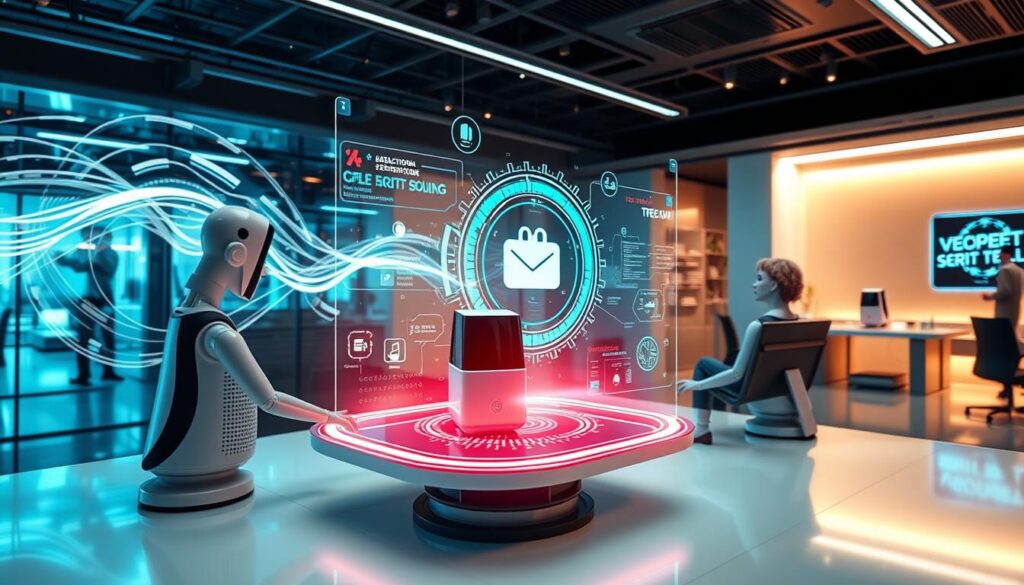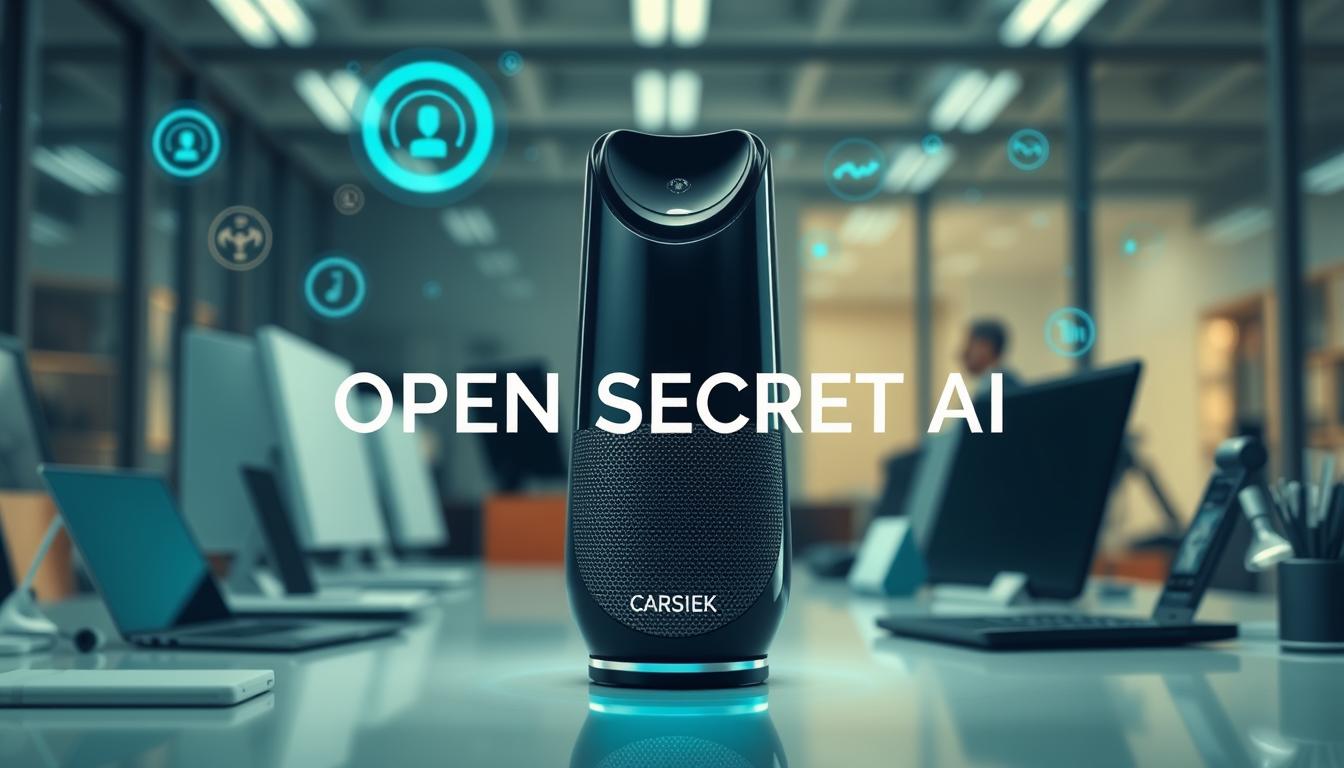Now, 80% of businesses use AI voice assistants for their front desk needs. This new tech is changing how companies talk to customers. It makes handling calls and messages easier and more cost-effective.
AI voice assistants are becoming a top pick for many industries. They can understand and answer customer questions quickly and accurately. This is thanks to their advanced natural language processing and speech recognition.
Key Takeaways
- AI voice assistants are always ready to help, even on holidays and weekends.
- They help businesses save money and work more efficiently, even with lots of calls.
- They offer personalized support in many languages, making customers happier and more loyal.
- They handle tasks like scheduling and follow-ups, so staff can focus on important work.
- They work well with other business systems, making the transition smooth and efficient.
Understanding the Evolution of Modern Reception Services
Traditional reception services faced big challenges like limited hours, high costs, and a lack of personal touch. But, digital changes have brought a new level of service excellence. AI, including natural language processing and speech recognition, has changed how businesses talk to customers.
Traditional Reception Challenges and Pain Points
Call centers used to be the main way businesses talked to customers. But, they often had long waits, were only open certain hours, and didn’t offer personal service. This made it hard for customers to get what they needed.
The Digital Transformation of Front Desk Operations
Technology has changed customer service a lot. AI chatbots and virtual assistants are now key players. They can handle many questions at once, making things faster and more efficient. These systems use natural language processing and speech recognition to understand and help customers better.
Impact of Technology on Customer Service Excellence
AI has made customer service better in many ways. It helps businesses offer more personal and smart solutions. AI can even guess what customers might need next, making interactions more relevant. Also, AI receptionists are always on, so no call is ever missed, even when the office is closed. This makes customers happier and more loyal.
| Key Statistics | Impact |
|---|---|
| Businesses adopting AI receptionists see a significant reduction in operational costs. | AI-powered virtual receptionists offer a cost-effective solution for businesses, reducing the overhead associated with traditional reception services. |
| Industries such as retail, healthcare, and home services are leading in the adoption of AI receptionists. | AI-driven reception services are proving to be particularily valuable in industries that require high levels of customer interaction and support. |
| AI receptionists offer 24/7 availability, ensuring no call is missed, even outside business hours. | Continuous availability and responsiveness are essential for meeting modern customer expectations and maintaining a competitive edge. |

The modern reception services have evolved a lot thanks to digital changes and AI. With technologies like natural language processing and speech recognition, businesses can now offer better, more personal service. This makes the customer experience much better.
The Rise of AI Voice Assistant Technology in Business
The business world has changed fast with AI and voice technology. AI voice assistants are now key for better customer service and cost savings. They help businesses work smarter and faster.
Thanks to machine learning, these smart assistants can do a lot. They answer calls, talk in different languages, and even have their own personalities. They use advanced tech to understand and answer customer questions, making tasks easier and faster.
More businesses want to offer service any time and save money. In the U.S., more people are using voice assistants. By 2026, 157.1 million will be using them, up from 146 million in 2024. Many already use voice search every day.
Using AI voice tech in business is a smart move. 88% of global leaders think it can grow their brand, and 82% are already using it. Most companies plan to use it more in the next five years. They see it as key to their future success.
| Key Findings | Percentage |
|---|---|
| Companies anticipating widespread deployment of voice technology within 5 years | 85% |
| Companies viewing voice-enabled experiences as critical to their future strategy | 66% |
| Executives aiming to enhance productivity through voice technology | 87% |
| Executives seeking new business opportunities through voice technology | 77% |
| Executives looking to boost revenue using voice technology | 62% |
AI voice assistants are changing how businesses talk to customers and work. As this tech gets better, companies that use it will stand out. They’ll offer a better experience to their customers.

Key Features and Capabilities of Virtual Receptionists
AI-powered virtual receptionists bring advanced features to the front desk. They use natural language processing and speech recognition for smooth voice commands and interactions.
These virtual assistants work 24/7. They help businesses offer reliable support to customers. They handle routine tasks like answering questions and scheduling appointments, so staff can focus on more important work.
Multichannel Communication Integration
Virtual receptionists can connect with many communication channels. This includes phone, email, chat, and social media. Their multichannel approach ensures a consistent and personalized experience for customers, boosting satisfaction and engagement.
| Feature | Benefit |
|---|---|
| Natural Language Processing (NLP) | Enables virtual receptionists to understand and respond to voice commands and conversational queries with natural language |
| 24/7 Availability | Provides round-the-clock support, ensuring timely responses and improved customer satisfaction |
| Scalability | Allows businesses to handle fluctuating call volumes and customer inquiries without compromising service quality |
| Multichannel Integration | Seamlessly connects various communication channels, delivering a consistent and personalized customer experience |
Virtual receptionists help businesses improve their front desk and customer service. They make operations smoother and customer interactions better. This leads to long-term success in today’s fast-changing digital world.

Cost-Effectiveness and ROI for Businesses
Using AI-powered voice assistants as virtual receptionists can save businesses a lot of money. These AI tools cut down on the need for human receptionists. This means less money spent on salaries, benefits, and training.
They also handle lots of calls without extra overtime costs. This makes the workspace and equipment more efficient.
The efficiency and productivity from artificial intelligence and machine learning reduce human mistakes. This leads to happier customers and more loyalty. Studies show that companies using AI can outperform others by 2024.
| AI Investment Metrics | Typical Range |
|---|---|
| Average ROI | 3.5X |
| Highest Reported ROI | 8X |
| Cost of High-Grade AI Models | $4 million |
| Cost of Off-the-Shelf AI Models | $14,000 |
| Cost of Custom AI Projects | $20,000 – $500,000 |
| Cost of Off-the-Shelf Chatbots | $99 – $1,500 per month |
| Cost of Custom Chatbots | $20,000 – $80,000 |
Businesses can see a big increase in their ROI by using AI-powered virtual receptionists. They get better efficiency, productivity, and customer satisfaction. All these help the bottom line.
“Automation is considered a necessity to stay competitive, enhances innovation, and adaptation to market changes.”
Industry-Specific Applications and Success Stories
AI-powered virtual assistants have changed how businesses talk to customers and work better. They help in many fields, from healthcare to banking, and even in cars and shops. These smart tools improve customer service, make work easier, and help businesses do better.
Healthcare and Medical Practices
In healthcare, AI assistants help with tasks like setting up appointments and managing patient records. This lets doctors focus on caring for patients. AI chatbots also help patients get information and advice, making things easier for everyone.
Banking and Financial Services
Banks and financial services use AI to help customers and make transactions smoother. Virtual assistants answer questions, handle simple tasks, and keep customers updated on their money. This means customers can get help anytime, and staff can do more important work.
Automotive and Retail Sectors
The car and retail worlds also benefit from AI assistants. They help with questions, order updates, and even booking service appointments. In retail, they answer customer questions and track orders, making shopping better and boosting sales.
AI voice technology has made a big difference in many industries. It improves customer service, reduces work for staff, and makes things run more smoothly. It’s a key tool for businesses wanting to succeed in today’s digital world.

| Industry | Key Applications | Benefits |
|---|---|---|
| Healthcare |
|
|
| Banking and Finance |
|
|
| Automotive and Retail |
|
|
“AI virtual assistants can increase employee productivity by up to 25%, contributing to significant cost savings according to the Harvard Business Review.”
Many industries now use virtual assistant, conversational AI, and voice technology to work better. This helps businesses improve how they serve customers, work more efficiently, and grow. These smart tools are key to success in today’s business world.
Implementation Strategies and Best Practices
Adding AI voice assistants to your business needs careful planning. Here are some key strategies and best practices to help you succeed:
- Customize the AI to match your brand identity: Make sure your AI’s voice and personality fit your brand. This will help create a consistent customer experience.
- Choose adaptable pricing models: Pick pricing that can grow or shrink with your business. This flexibility is key for scaling your AI voice assistant.
- Ensure seamless integration with existing systems: Make sure your AI works smoothly with your CRM and other software. This integration is vital for a smooth workflow.
Here are some best practices to keep in mind:
- Train the AI on industry-specific knowledge: Give your AI a deep understanding of your industry. This will make it more effective in handling customer questions.
- Regularly update the AI’s capabilities: Keep improving your AI by learning from customer feedback. This will help it get better over time.
- Maintain a balance between automation and human touch: Use AI for routine tasks, but make sure customers can talk to humans for complex issues. This balance is important for customer satisfaction.
To successfully use AI voice assistants, talk to your team and customers about the new tech. By following these tips, you can make the most of AI tools. This will improve your customer experience and make your business more efficient.
| Key Benefits of AI Voice Assistants | Statistics |
|---|---|
| 24/7 Support and Enhanced Customer Experience | AI voice assistants offer round-the-clock support. They make customer interactions faster and more personalized. |
| Improved Operational Efficiency and Cost Savings | Using AI for routine tasks boosts efficiency and cuts costs. It frees up human agents for more complex tasks. |
| Engaging Customer Interactions | New tech like voice cloning and natural language processing will make customer interactions more engaging. |

“AI voice assistants change customer service by automating tasks, providing instant help, and personalizing interactions through advanced algorithms.”
Security Considerations and Data Protection
As artificial intelligence and voice technology grow, businesses must focus on security and data protection. This is key when using AI tools like virtual receptionists. It’s important to follow privacy rules and industry standards to keep customer data safe and build trust in the technology.
Privacy Compliance and Regulatory Standards
Using voice technology must follow strict privacy laws like the General Data Protection Regulation (GDPR). Companies need to be clear about how they collect and use data. They must get customers’ consent and follow rules on data use and storage.
Data Encryption and Storage Protocols
Strong data encryption and safe storage are vital to protect customer info. Regular security checks, access controls, and hiding personal data are key steps. They help keep voice recordings and transcripts safe and private.
Customer Information Protection Measures
- Implement strict access controls and multi-factor authentication to prevent unauthorized access to customer data.
- Regularly review and update data retention policies to minimize the storage of sensitive information.
- Develop a thorough data breach response plan to quickly handle and reduce any security issues.
By focusing on these security and data protection steps, businesses can use artificial intelligence and voice technology well. This way, they can keep their customers’ trust and privacy safe.

“Balancing technological innovation with strong privacy measures is key in the voice AI field. It helps tackle privacy and security issues well.”
Overcoming Common Implementation Challenges
Adding AI voice assistants to business operations can be tough. But, with smart strategies, companies can beat these hurdles. This way, they can fully use this new tech.
One big challenge is linking AI with old systems and software. It needs careful planning, lots of testing, and a step-by-step approach. This ensures a smooth change. Another issue is when staff is hesitant about AI changing their jobs. Training and explaining AI’s benefits can help ease these worries.
It’s also key to keep the human touch in customer talks with AI. Businesses can make AI systems friendly and personal. This mix of AI’s speed with human care is important. Regular updates and feedback help make AI better for customers.
Security and privacy are also big concerns with AI voice assistants. Companies must follow data rules, use strong encryption, and be open about how they use customer info. This builds trust and confidence in AI solutions.
| Challenges | Strategies for Overcoming |
|---|---|
| Integration with Legacy Systems | Phased implementation, thorough testing, and seamless integration |
| Staff Resistance to Change | Comprehensive training programs and clear communication of benefits |
| Maintaining Human Touch in Customer Interactions | Designing AI systems for personalized and empathetic experiences, collecting regular feedback, and continuous system refinement |
| Security and Privacy Concerns | Ensuring compliance with data protection regulations, implementing robust encryption protocols, and providing transparent data handling policies |
By tackling these common issues with smart planning, training, and focus on user experience, businesses can successfully add AI voice assistants. They use natural language processing and speech recognition to improve customer service and work flow.
“Integrating AI into existing systems can be challenging, particular for hotels using legacy software that may not seamlessly interface with newer AI technologies.”

Conclusion
AI voice assistants have changed customer service in many industries. They are always available, save money, and make customer service better. They also make businesses run more smoothly.
As AI gets better, it will help even more. It will use smarter data and talk like humans better. This will make AI voice assistants even more useful.
Companies that use AI voice assistants will get ahead. They will offer better service and work more efficiently. This is because more people want easy and personal service online.
Using AI voice assistants is key for businesses now. It helps them be more flexible, happy customers, and succeed in the long run. The future of customer service is all about AI, and smart companies will use it to their advantage.
FAQ
What are the key benefits of businesses adopting AI voice assistants as receptionists?
AI voice assistants work 24/7, saving money, and handle lots of calls well. They make customer service better, boost productivity, and help get more leads. They also fit well with what you already have.
How has the digital transformation of front desk operations led to the adoption of AI-powered solutions?
New tech like natural language processing and speech recognition has improved customer service. It gives quick, accurate answers and cuts down wait times.
What are the key features and capabilities of AI voice assistants in business?
AI voice assistants understand natural language, work all the time, and scale up. They handle voice commands and work across different channels. You can customize them to fit your brand and get detailed analytics.
How do AI voice assistants contribute to the cost-effectiveness and ROI for businesses?
They cut down on the need for human receptionists, saving on salaries, benefits, and training. They work without overtime, saving on space and equipment. Their efficiency boosts productivity and customer happiness, leading to a better ROI.
What are some industry-specific applications and success stories of AI voice assistants?
In healthcare, they book appointments and give information. In banking, they answer customer questions and handle basic transactions. In the automotive and retail sectors, they help with product inquiries and customer support.
What are the key strategies and best practices for implementing AI voice assistants?
Customize the AI to fit your brand, choose flexible pricing, and integrate it smoothly with what you already have. Train the AI on your industry’s knowledge, keep it updated, and balance automation with human touch.
What are the security and data protection considerations when implementing AI voice assistants?
Follow privacy laws, use strong encryption, and store data securely. Be open about how you collect and use data to keep customers trusting you.
What are the common challenges in implementing AI voice assistants, and how can they be overcome?
Integrating with old systems, getting staff on board, and keeping a human touch can be tough. Use a step-by-step approach, train staff well, and keep improving the AI. Set clear goals and listen to feedback.


